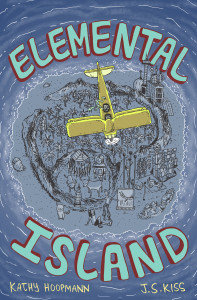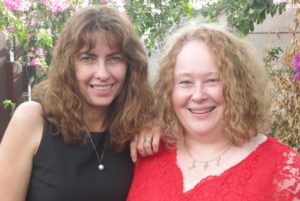
Elemental Island is the first written collaboration between bestselling author of Blue Bottle Mystery & All Cats Have Asperger Syndrome Kathy Hoopmann & exciting new JKP author (Judit) J.S Kiss. In this interview for the JKP Blog they discuss challenging the stereotypes around autism, bridging the gap between mainstream and special ed and winning the Silver Nautilus Award for middle-grade fiction.
Elemental Island, your very first novel together, has just won a rather prestigious silver Nautilus Award in the middle-grade fiction category. How do you feel about that?
Kathy: Obviously, we are thrilled. This award is given to books that change the world and we share the honour with the likes of the Dalai Lama, Desmond Tutu and Malala Yousafzai. It is exciting to know that others recognise the powerful, potentially world-changing message within the book.
Tell us how the two of you met and how you came to collaborate on the book Elemental Island?
Judit: One of the joys of living an expat life is the people you meet. When we were both living in the United Arab Emirates we met through a writing group and became great friends. Eventually I moved to Budapest but that just gave Kathy an excuse to visit and on one such occasion we were mulling over what it would be like if the whole world was full of people on the Autism spectrum and ‘neurotypicals’ were diagnosed with Social Syndrome. Before we knew it we had filled a notebook with ideas drafted a proposal and sent it off to Jessica Kingsley Publishers, who immediately said “Yes!”
Kathy: I had never worked closely with another writer before, so it was exciting to delve into the world of co-authorship. I was struck by how much richer a novel could be when two minds were at work. We fed off each other’s imagination and brought out each other’s strengths.

The book is set in a place where logic and science rule and the main character (Astie) is on the verge of being diagnosed with ‘Social Syndrome’ (being ‘neurotypical’ is different or odd in this alternative world). Do you as writers enjoy playing with and challenging stereotypes and if so how do you think this helps showcase the main themes of the book to a young audience?
Judit: Change is only brought about by challenging stereotypes and our aim with writing Elemental Island was twofold. We wanted to reach children on the spectrum and show them a version of what life might be like in a world that’s tailor-made for them and we wanted to reach ‘neurotypical’ children to help them realise what it might be like to live in a world where you are the ‘odd one out’. Without giving too much of the plot away the ultimate conclusion of the book is that we need diversity and that each person regardless of whether they have some form of diagnosis or not fits into and is a vital part of the tapestry of life.
One of the primary themes in the book seems to not just encourage an understanding of the differences that people with Asperger’s Syndrome (ASD) have but celebrate them. Is this something you think all children should learn about in school and how can a book like Elemental Island help to do that?
Judit: We passionately believe that different traits, abilities and personalities are equally valuable and worth celebrating because they complement each other and allow each person to enrich the world in their own unique way. This message definitely needs to be taught in school as well as at home so children can learn not only to accept but also to respect each other and themselves for who they are. We hope that Elemental Island will thrill and entertain, but also contribute to bringing this message home to the reader.
Do you think that the gap between mainstream and special needs school children is being bridged, are things getting better in terms of understanding and how can children’s fiction help with that?
Kathy: Frankly, every child has ‘special needs’ because every child requires support in something at some time. To use the term ‘special needs’ as a negative is a sad indictment on a society that sets barriers up around what should really be regarded as very mainstream when it comes to schooling, in saying that some countries are far in advance of others when it comes to setting up a school system to support all children’s needs. When Tony Attwood (author of The Complete Guide to Asperger’s Syndrome) read our book he said that as well as being a captivating read Elemental Island could change and enhance our perception and understanding of the challenges faced by those who have an Autism Spectrum Disorder. His opinion is that fiction can often create a paradigm shift more effectively than facts… and that was exactly our aim. We wrote this book to entertain but also to help bring about change so that the gap between what is considered mainstream and what is considered ‘special needs’ is re-identified as a simple recognition of meeting the child’s needs whatever they are.
Finally, Astie has a great deal of trouble deciding what her thesis should be on, have either of you thought what your own thesis would be if you were on Elemental Island?
Judit: I have a very inquisitive mind so I would probably end up with several theses. My current pick would be time travel since I am in the middle of researching whatever science is available on the topic for our next novel.
Kathy: My initial career choice as a child was to be the first woman on the moon but as flying is prohibited on the island the best I could hope for would be to build a hope machine, which I don’t think I would satisfy me. I am fascinated by the human body though and how it works so I think I would focus on that.
Kathy Hoopmann & J.S Kiss’ award-winning book Elemental Island is now available from Jessica Kingsley Publishers